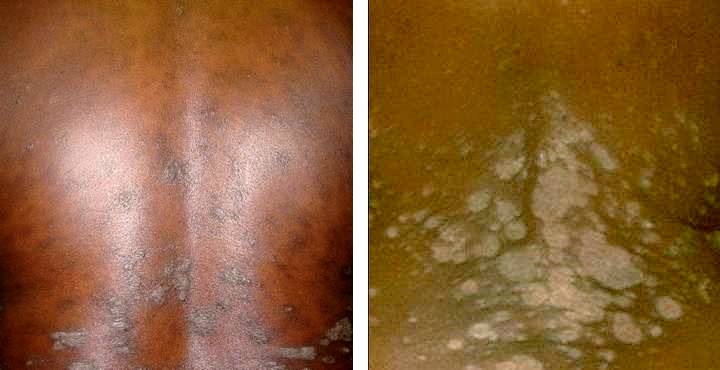 The image people have in mind of psoriasis does not always match the range of symptoms we tend to see on darker skin.
The image people have in mind of psoriasis does not always match the range of symptoms we tend to see on darker skin.
Compared to pale complexions, the incidence rate of psoriasis on dark skin is lower but not notably so and the disease can bring greater issues. Aspects of treatment could have an influence but a more common cause is later diagnosis.
Medical staff who are used to the pink to red plaques and silvery scales psoriasis brings on fair skin might not immediately recognise the subtler, red to purple lesions that can occur on dark skin.
This may mean the disease is more extensive before treatment begins, which brings a further downside. After the psoriasis lesions resolve, they may leave dark, or light patches of skin discoloration, as can certain types of treatment.
Treating Psoriasis
In an effectiveness sense, there is no core difference in treating skin of any colour. Creams, or oral medication may be an option but some can affect skin tone. Phototherapy is more likely to do so and is not often the first choice for patients with darker skin.
None of these options need to be ruled out, there can be times where a trade off will make sense but modern science is producing sound alternatives.
Biologics may be an option, genetically engineered proteins which dampen down parts of the immune system that fuel inflammation. Ultraviolet light is a possibility, as is laser treatment, in combination with a sensitising agent.
Following individual diagnosis and an understanding of your medical history, your consultant will naturally discuss options with you. Whilst psoriasis can not be permanently cured, the condition can be well managed.
Prompt Action
A family history of psoriasis could play a part in cases, or triggers such as stress, illness, or injury. Awareness of these factors helps but psoriasis can still occur for any of us and on varying parts of the body.
Along with the torso, this can include your elbows, knees, or scalp, or nails. Being vigilant matters, as early diagnosis and treatment will lessen the disease’s impact, along with the risks of hyperpigmentation.
Rather than clear psoriasis plaques, initial symptoms can be flaking, dry skin, which may show redness, or purple to grey brown tinges. The patches could be itchy, painful, or hold pus inside but not always.
The key is to arrange to see an experienced dermatologist when you spot the problem. Psoriasis is a condition which affects quality of life for all patients and can have a more profound impact on darker skin.
For advice, or to arrange an appointment with a consultant, you are welcome to contact us at any time. Personal psoriasis treatment is an important part of dermatology for darker skin, a condition which warrants the best care.
For any assistance, or to book a consultation, call 020 8441 1043, or send an email via the Make An Appointment button below.
